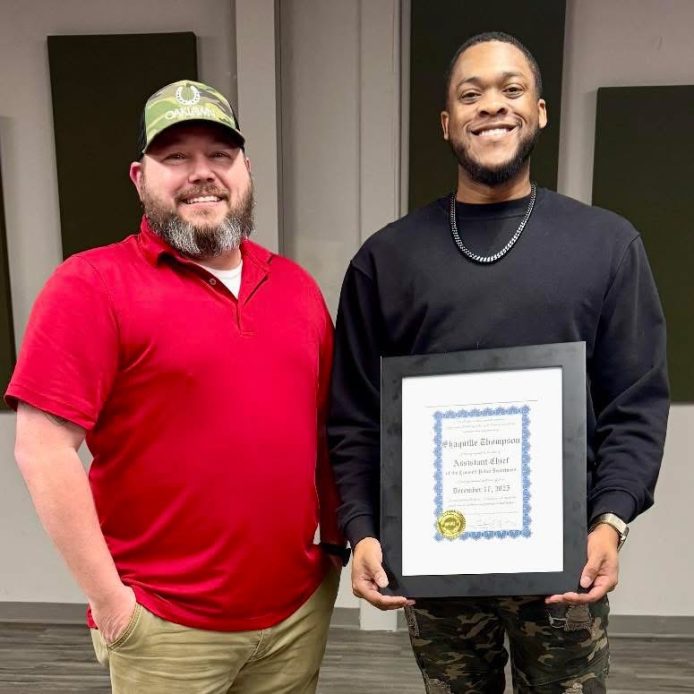
On December 19, the University of Arkansas at Monticello College of Technology-Crossett (UAM-CTC) was awarded $2 million from the Arkansas Division of Higher Education (ADHE) through the Higher Industry Readiness through Educational Development (HIRED) Grant. The university will use the funds to establish the UAM Sustainable Trade Alliance.
The grant was part of a larger announcement held at the Arkansas State Capitol on Thursday, during which Governor Sarah Huckabee Sanders, Arkansas Division of Higher Education Commissioner Ken Warden and Chief Workforce Officer Mike Rogers awarded 14 institutions of higher education throughout Arkansas nearly $26 million for workforce training programs through the HIRED Grant.
UAM-CTC will use the funds to establish the UAM Sustainable Trades Alliance, a collaborative initiative involving multiple UAM entities and alliance partners who each uniquely contribute to the forestry supply chain. The Arkansas Center for Forest Business, housed in the College of Forestry, Agriculture and Natural Resources (CFANR) at UAM, will work closely with alliance partners to develop training for forest product mill and logging workforce needs as part of the project.
“The recent announcements of a new dimension lumber mill in Monticello and expanding production capacity at the papermill in Crossett highlight the relevance of this project,” said Dr. Matthew Pelkki, director of the Arkansas Center for Forest Business and professor and George H. Clippert Chair of Forestry at UAM.
The alliance will be based on the UAM-CTC campus in Crossett, Arkansas, where programs that address forestry automation and industrial maintenance are currently offered, including Manufacturing Principles, Industrial Equipment Repair, Industrial Production Technology, Advanced Manufacturing Technology, Electromechanical Technology, Electromechanical Technology-Instrumentation and Heating, Ventilation, Air Conditioning and Refrigeration.
Additionally, the Heavy Equipment Operation and Diesel Technology programs at the UAM College of Technology-McGehee (UAM-CTM) will be included in the alliance.
Nearly 45 industry partners were engaged in the planning process for the grant, aiding UAM in developing a project that will meet the needs of the forestry industry in Arkansas.
The Arkansas Center for Forest Business gathered 30 industry leaders for the first Arkansas Forest Competitiveness Council on October 7, 2024, in Hot Springs, Arkansas. This group will serve as a guiding body to help the Arkansas Center for Forest Business and the UAM Sustainable Trade Alliance focus on industry and workforce development needs.
The UAM Sustainable Trade Alliance aims to prepare students to be members of the workforce through development in three key areas: employability skills, or “soft” skills, such as communication, dependability, teamwork and leadership; technical skills, such as electrical troubleshooting, use of tools and machinery and use of technology; and compliance/regulatory skills, such as knowledge of labor laws, safety regulations and industry standards for operation.
Dr. Peggy Doss, chancellor of UAM, offered thanks and emphasized the importance of the grant, stating, “We are incredibly grateful to the Arkansas Division of Higher Education for awarding the UAM College of Technology-Crossett $2 million through the HIRED Grant to establish the UAM Sustainable Trade Alliance. This significant funding will allow us to enhance workforce development initiatives in forestry automation and advanced manufacturing, which are vital to Arkansas’ economy.”
“The UAM Sustainable Trade Alliance will be a collaborative effort that leverages the strengths of various UAM entities and industry partners, all committed to addressing the needs of the forestry supply chain. With the support of dozens of industry partners and the insights gathered from the Arkansas Forest Competitiveness Council, we are confident that this project will meet the workforce training needs of Arkansas,” Dr. Doss said. “We thank Governor Sanders, Commissioner Warden, Chief Workforce Officer Rogers, Representative Beaty, Representative Wardlaw and Senator Gilmore for their ongoing support. We are also deeply grateful to our workforce alliance partners, including industry partners and economic developers, for their invaluable expertise and guidance during the grant’s development. We look forward to their continued support during the implementation of this project,which will not only benefit our students but also strengthen our communities and local industries.”














